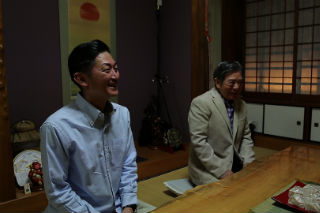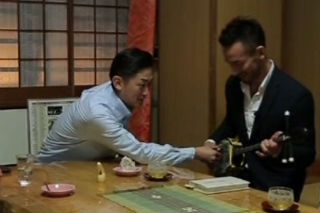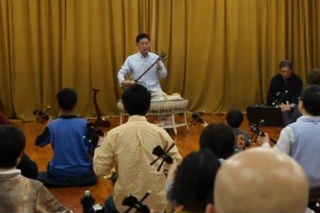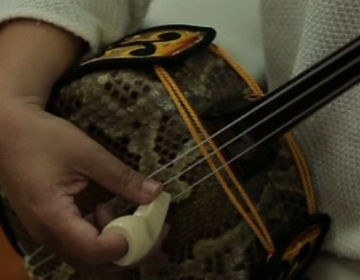Spreading Ryukyu performing arts all over the world
Sanshin is an essential instrument in Ryukyu performing arts. Sanshin plays Ryukyu scale, and its sound has been handed down from generation to generation. Nakata visited Chokichi and Tomokuni Terukina, father and son who belong to Afusoryu musical group. Choichi has been playing the Sanshin since youth, and has earned many awards. At the age of 25, he started to study under Haruyuki Miyazato, the grand master of classical music Afusoryu group. In 2000, he became the first person to be designated as Living National Treasure from Okinawa in the performing arts class. Now, together with his son and also the grand master, Tomokuni, he is striving to spread Okinawan cultural arts by performing not only within Japan but also all over the world.

The unique Okinawan scale of Sanshin
When asked the difference between Sanshin and Shamisen, Choichi-san answered, ”Normally scales have 7 notes in the scale sound, but in Okinawan scale we have just 5. We don’t have the notes ”D” and ”A”. If you play with this scale, anything will all sound like Okinawan music.” Nakata actually tried playing Sanshin. You hold the pick with the right hand, and the neck in the left. Nakata was shown the finger position of each sound, and started playing the musical scale. It was pretty difficult, but he was able to feel the Okinawan scale with his entire being.

Celebration song “men-so-re”
It was practice day when we visited, so we were able to listen to live Ryukyu music. Tomokuni-san was the instructor. ”Men-so-re” was the number of the day, a song played to celebrate the completion of Shuri castle. The performance started among students of all ages, and Nakata enjoyed this relaxing moment, sometimes keeping rhythms. We asked Tomokuni what he thinks about this traditional culture he has inherited from his father, he answered, ”Not everybody needs to play Okinawa music just because they are residents of Okinawa. I feel that Sanshin music is a symbol of peace. To hand it down to the next generation, I want to leave the memory of the sound to the ears of people as much as I can.”




